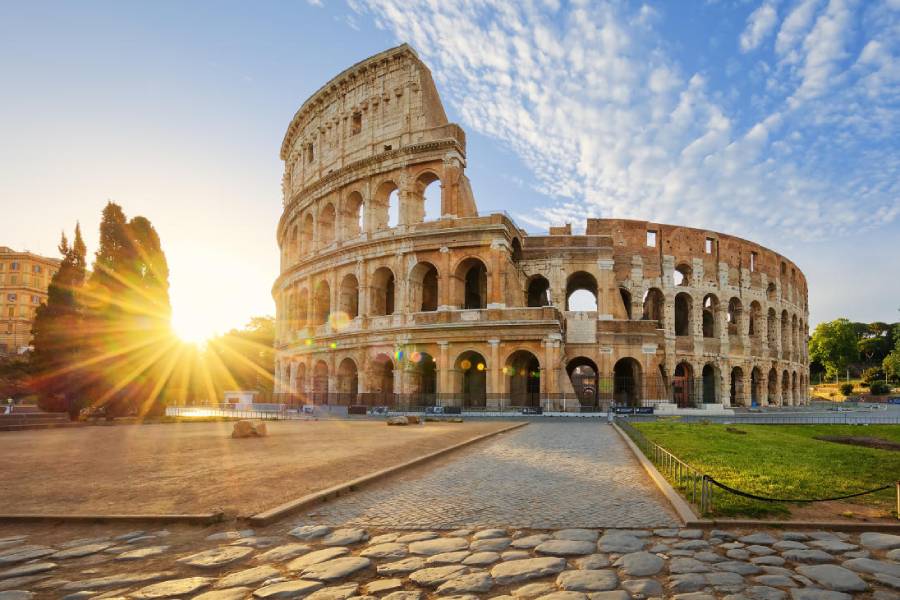Brought back to life
Sir — All across the world, museums and other historical sites have been steadily losing their appeal and, thus, their income. The Colosseum in Rome is trying to change this. Airbnb and the Colosseum Archaeological Park have signed a deal with the film franchise, Gladiator II, to allow a few tourists to gain ‘authentic’ gladiatorial experiences at the Colosseum. But locals are furious about the turning of an archaeological site into a theme park. They need to understand that while protecting heritage sites is necessary, immersive activities draw more crowds and help in the long-term viability of these places. Re-enacting the Battle of Plassey, for example, might generate enough revenue for the government to bring back Murshidabad’s museums from the brink of ruin.
Shirsha Jha, Berhampore
Rich harvest
Sir — The article, “Gandhi goes rural” (Nov 16), by Ramchandra Guha was a timely reminder of our humanitarian responsibilities amidst the global turmoil due to wars in Ukraine and Gaza, the rise of right-wing governments, and the failure of climate action summits. The story behind the establishment of Phoenix Farm by M.K. Gandhi and its maintenance by his son, Manilal Gandhi, after the former’s departure to India to participate in the freedom struggle, is poignant. This is a lesser-known chapter of M.K. Gandhi’s life and readers were enriched by the column.
K. Nehru Patnaik, Visakhapatnam
Sir — The Phoenix Farm in Durban is an embodiment of Mahatma Gandhi’s ideology of satyagraha, tolerance and non-violence. It now houses a medical clinic, an HIV centre, and other facilities. Another similar initiative by M.K. Gandhi in South Africa is the Tolstoy Farm, which was founded in 1910. Gandhi was deeply influenced by Leo Tolstoy’s The Kingdom of God Is Within You. These settlements represent his struggle against racism in South Africa and contributed to shaping his ideology on the uplift of rural society.
Prasun Kumar Dutta, West Midnapore
Sir — Ramachandra Guha shed light on the Phoenix Farm and the Indian Opinion, a 100-acre settlement and a newspaper, respectively, founded in rural South Africa by M.K. Gandhi a century ago. The inter-faith prayers offered at the Farm where all religions were placed on the same pedestal attracted the English dissenter, Albert West, who played a key role in running the Farm and the newspaper after Gandhi left South Africa in 1914. In her book, Uma Dhupelia-Mesthrie — she is Gandhi’s great-granddaughter — gives a comprehensive account of the settlement.
Sukhendu Bhattacharjee, Hooghly
Undaunted spirit
Sir — Moumita Chaudhuri deserves to be lauded for the article, “In the middle of death, life” (Nov 17), which tells the story of Tumpa Das who manages a crematorium and is a professional ‘dom’. She had taken up the job after her father’s demise to financially support her family and has remained employed at the crematorium for almost a decade. Despite being shunned by her neighbours — who bathe upon coming in contact with her — for performing funeral rites, she refused to succumb to their puritanical pressure. The ABP Ananda Sera Bengali Award, which was bestowed on Das, among other dignitaries, was instrumental in bringing her story to the forefront.
Kajal Chatterjee, Calcutta
Sir — Although Tumpa Das’s neighbours distanced themselves from her owing to her choice of profession, she continued her service to humanity. The Telugu poet, Gurram Jashuva, wrote about the mythical king, Satya Harischandra, serving as a caretaker at a burial ground. Jashuva had described the crematorium as a place where kings and paupers meet the same fate. During Hindu funeral ceremonies, women are not allowed to perform the rites. But Das has subverted these religious norms.
T. Ramadas, Visakhapatnam
High on drugs
Sir — The menace of drug addiction has been on the rise in both urban and rural areas. Such addiction has a devastating impact on the addicts, their families as well as society. While the Centre has tried to float the Nasha Mukt Bharat Abhiyaan, state authorities seem reluctant to take adequate actions to this effect.
Jakir Hussain, Kanpur
Sir — Despite the tall claims by top leaders of the Bharatiya Janata Party, Gujarat is far from being a model state. It has become notorious for drug smuggling. Around 700 kilogramme of methamphetamine was recently seized near Porbandar, Gujarat. This is not the first time that a drug haul has been made at a port in Gujarat. The BJP government in the state should take strict action to remedy the situation.
Tharcius S. Fernando, Chennai
Get moving
Sir — According to The Lancet Global Health, 57% of Indian women and 42% of Indian men do not perform sufficient physical activity (“Stretched”, Nov 18). An increase in the consumption of fast food, coupled with a sedentary lifestyle, is to be blamed for this. Such unhealthy practices can give rise to various lifestyle diseases. The government should promote light exercises like yoga and aerobics to make citizens more active.
Ubaida Abul Hasanat, North 24 Parganas
Historic house
Sir — It is heartening that Visva-Bharati University will soon reopen the Santiniketan Griha, the oldest and the first building in Santiniketan, to tourists (“Oldest Tagore trove to reopen”, Nov 18). Since March 2020, the building remained closed for tourists. The university’s decision will surely encourage many to visit Santiniketan.
Sourish Misra, Calcutta

